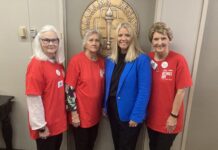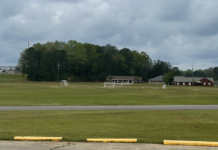October 5, 2021
H.B. 4 passed by the Alabama Senate today [Friday Oct 1, 2021] on a vote of 29 Yea, 2 Nay, and 4 abstentions. The bill previously was passed by the House on a vote of 74 – 27 – 2. Senators Bobby Singleton, April Weaver and Representative Russell Bedsole voted for the final Bill and Representative Ralph Howard cast a Nay vote.
The bill is intended for the purpose of:
- implementing a prison modernization plan in a phased approach that would replace existing bed space in Department of Corrections facilities through the construction of a new specialized men’s prison facility on state-owned land in Elmore County providing specialized services to inmates;
- the construction of a new prison facility for male inmates on state-owned land in Escambia County;
- the construction of a new women’s prison facility on state-owned land in Elmore County;
- the renovation and improvement of existing state-owned prison facilities in certain counties.
- paying for the cost of constructing the specialized men’s prison facility and the Escambia men’s prison facility; and
- paying for the cost of renovation and improvement of existing state-owned prison facilities in Jefferson and Limestone Counties and an additional men’s prison facility selected by the authority and to be located in Barbour or Bullock County, and
- the construction of a women’s prison facility.
Prior to the enactment of today’s Bill there had been concerns voiced by many that the prison construction plan would result in the closure of a number of facilities that presently exist. Such indiscriminate closings could work hardships on counties and municipalities that have taken on bonded indebtedness to secure the construction of facilities to support prisons, such as major water and sewer improvements.
While early draft bills did not name the existing state prison in Brent as a candidate for closure rumors have circulated that the Brent site was scheduled for demolition in the phased construction plan.
The original draft language of the Bill did not contain any specific mention of the Brent facility nor any assurances that closed prisons would be used for any other purpose(s).
State Senator April Weaver expressed concerns that the closing of any prison facility as a result of this prison construction bill would traumatize local economies that made expenditures and created debt to support the original construction of some prison facilities. Even though bill supporters and sponsors voiced assurances that abandoned prison facilities could be repurposed for other programs, such as retraining or mental health services, there were no such guarantees or assurances in explicit bill language.
The final version of the Act now contains the following language:
Section 7. (a) Prior to the closure of any facility
as the result of the provisions of this act, there shall be established a commission to study the economic impact of the closure of the facility, any possible repurposing of the facility, and any outstanding obligations of the facility to a local governmental entity or utility board.
This language guarantees that prior to closing any facility there must be a site assessment and a process that must be followed before taking any action that might cause harm to a local economy.
The passage of the final bill was applauded today by Senator April Weaver (SD14) who provided the following statement about the legislation:
“I am pleased to have added an amendment to HB 4 that will allow the Bibb Correctional Facility to remain in discussions in the future. Let me be clear that this amendment does not revive the previously proposed Brierfield prison site, but simply enables a future site assessment related to the current Bibb County location,” said Weaver.
“In no way does this secure a new prison in Bibb County, nor does it guarantee that the current [Brent] facility will remain operational. However, it brings to light that those jobs are important, the infrastructure is important, and that Bibb County will continue to be in discussions,” Weaver continued. “My biggest concern was making sure we left the conversation open to determine if the site could possibly continue on in the future. After meeting with local officials, I heard loud and clear how important the current prison is to the City of Brent and other entities in Bibb County. They asked me to make a stand and I was proud to do so on their behalf. I cannot make any promises about the future of this site, but I can promise that I fought to keep the people of my district in the discussions.”
State Representative Russell Bedsole (HR49) said: “Senator Weaver deserves credit for standing up to insist on language in the bill that would serve the future interests of Bibb County. She asked for language in the bill that would require a site assessment for any facility considered for closing and the committee charged with that responsibility might use the facility for post release or mental health treatment purposes.” Bedsole also credited legislative leadership for getting the prison bill accomplished in a 5 day special session.
Representative Bedsole has a lot of experience with corrections since his full time occupation is Captain of the Shelby County Sheriff Office and he runs the Shelby County jail division. Bedsole said that the bill passed on Friday was a step in the right direction for much needed reform and improvement in the Alabama Department of Corrections prison system. Presently Bedsole said the prison system runs on a model of about 80% of prisoners housed in dormitory facilities and 20% in 2 person cells. Among many needed changes Bedsole said the system should be structured so that about 60% are in cells and 40% in dormitories.
Senator Bobby Singleton (SD24) also gave credit to Senator April Weaver for diligently working out amendment language for the prison bill to protect interests of Bibb County. Singleton said that the new prison bill presents less liability for the State of Alabama than the prior private prison plan and it looks down the road over a longer period of time with phased in building projects. The State has a III Phase plan spread over a longer period of time to make adjustments to current prison conditions.
Senator Singleton also discussed bill provisions to purchase the vacant private prison now called the Perry County Correctional Center. The new bill provides funds for the $19M purchase of the property, located on U.S. 80 in Uniontown, just west of Selma. The Perry County Correctional Center was built in 2006 by LCS Corrections Services Inc. It provided services for Immigrations and Customs Enforcement and the U.S. Marshals Service. It has also housed inmates for the Alabama Department of Corrections. It has been vacant since 2015. (https://www.al.com/news/2020/01/state-discusses-purchase-of-private-prison-in-perry-county-because-of-holman-closing.html)
New plans for the Uniontown prison include renovations, taking the facility from a 700 bed unit to about 400 bed capacity, and repurposing space for treatment and rehabilitation of prisoners and probationers in the system. The renovated facility will be used to deal with probation violators instead of returning them to other incarceration facilities. There will be post-release treatment, counseling, and education programs, including job training.
Senator Singleton said that Phase III of the prison plan, not in the bill passed yesterday, may include additional prison capacity for the Brent prison facility property. Since Phase III is down the road, any additional construction for Bibb may not be on the table before 2025. Singleton also said that any new facilities would be built on state owned property. He said this means that if additional prison capacity is built in Bibb County it will be on the land presently owned by the State connected to the current Brent prison facility.
State Representative Ralph Howard (HR72) voted against the prison bill. In a discussion with Representative Howard he said the state has committed to spend $499 Million on prison construction without spending any money to address the systemic problems with the incarceration of prisoners. “All of the approved expenditures go to brick and mortar for prison buildings. This bill will do nothing to put a dent in the overall growth of the Alabama prison population and the need to reduce recidivism in the system.” Howard went on to say “all we are doing now is warehousing prisoners. They should be engaged in productive activities while they are in the system.” Howard also said “we have school buildings in this State that are older than our prison facilities and in need of repair. I would rather spend state dollars on improving education facilities than building more prisons.”
The Senate and House passed several bills to address the longstanding crisis surrounding Alabama’s prison system. The Prison Infrastructure Bill Package was sent on Friday afternoon to Governor Kay Ivey’s desk for signature.
















